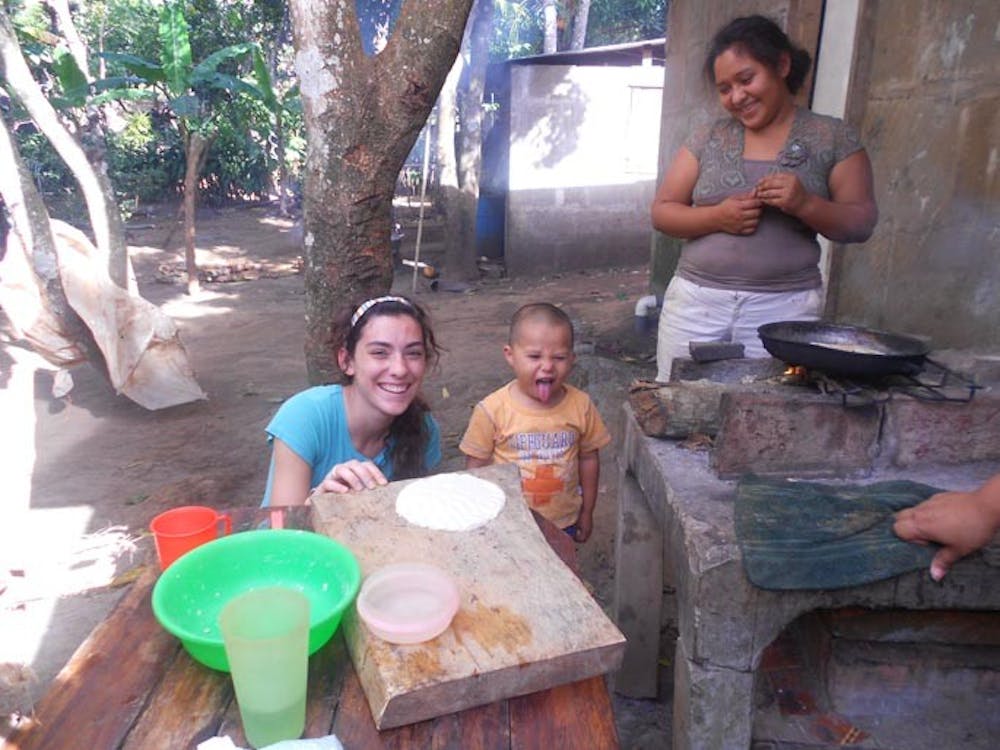Forgoing a snowy Christmas at home with her family in Fishers, Ind., sophomore Spanish major Bailey Shannon embarked on a journey to Nicaragua, the poorest country in Central America, according to the CIA Factbook. This 18-day-long trip in the small village El Tanke within Masatepe, Nicaragua changed her views about missionary work.
“When I got to Nicaragua I saw these huge buildings the church had created but no leadership,” Shannon said. “Missionaries have been going to that area for years, and yet a lot of the local families didn’t have Bibles, which is crazy.”
Ministerio Cristiano Nuevos Horizontes, meaning New Horizons Christian Ministry, was started by a Nicaraguan refuge and the once-pastor of Shannon’s home church, BridgeWay Community Church, in Fishers. The Nicaraguan church grounds include four buildings built by Shannon’s church. After seven years of building facilities, the question was raised as to how was it helping the people of Masatepe.
Shannon took the trip with BridgeWay Community Church Associate Pastor Brandon Weidman and his wife, Hannah, who came to assess how effective the church was serving the local community. Shannon said there were needs not being met that went beyond building facilities, which included things as simple as clean water.
“Our ideas as Americans of going to other countries and helping is good but flawed,” Shannon said. “We’ve made it into a strategic plan to conquer poverty but really it’s building relationships and friendships and learning about their needs.
“It’s not just giving people stuff.”
Shannon is no stranger to mission work, three years ago she went with her church to Mexico to build houses for people in Tijuana, Mexico. However, she felt guilty for staying in a nice resort while they were there to serve the homeless. While the people were grateful for having homes given and built for them, she realized she and the other missionaries were taking the jobs of the local construction businesses.
“It was hurting them in the long run,” Shannon said. “We were only meeting short-term needs, not looking at long-term needs.”
In Nicaragua, a plan to create a long-term boost for the community is underway. Shannon said the only grocery store with a safe supply of food is Wal-Mart owned “Pali,” where none of the profits go to the area but to the American corporation.
One ministry goal that Shannon wants to see is the opening of local businesses in the village that will make the community more self-sustainable. BridgeWay Community Church plans to create three businesses that Nicarguans will run and help improve their economy.
“There’s a cliché that every Christian missionary opens a coffee shop,” Shannon said, “But I think it would be really neat.”
Shannon lived with locals in the small village and experience their daily lives. She did arts and crafts with girls in the village, cooked with neighbors and explored the area.
“I got to live amongst them,” she said. “Every morning I would wake up to the neighbors singing while washing their clothes. I got to know their stories and got more personal with everyone.
“It’s not what can I do, it was more about what is God showing me and how can I love these people better.”
During her visit she became friends with 20-year-old Guesell, who at the time was studying to take her entrance exam to go to school to be an orthodontist.
“We are in the same boat,” Shannon said. “Except she lives in a third world country.”
While Guesell herself lives in a developing country, she also wanted to do missionary work to improve the lives of children who live in poverty, which gave Shannon a new perspective.
“I felt like God rebuked me in that moment,” she said. “Like He was saying, ‘While she lives in a third world country, she has the same hope and a future just like you.’”
While there, Shannon noticed there were many problems with alcoholism and that nonexistent family structures were evident in the area. It was accepted for a man to father multiple children with several women and claim no responsibility. Shannon said that it’s common for young women to become pregnant at early ages. as well.
One thing Nuevos Horizontes is doing to help young men break away from the pattern is gain influence through a growing youth soccer ministry.
“You don’t know their lives until you go and live with them,” Shannon said. “Then you can know their needs.”
The culture shock Shannon experienced proved to change her perspective. Nicaragua, according to the CIA Factbook, is slightly smaller than the state of New York. Most Nicaraguans have dirt floors and only running water for cooking and cleaning purposes. Only the wealthy have concrete floors and indoor plumbing.
Christmas didn’t consist of Santa Claus, present-giving and Christmas trees in Nicaragua. One tradition included a ram horn being blown at 4 a.m. the mornings leading up to Christmas Eve, or La Noche Buena. Shannon equated La Noche Buena with Fourth of July because fireworks and sparklers were lit throughout the night.
New Year’s Eve traditions proved to be significantly different than America’s televised traditions. Shannon said people made scarecrows filled with gun powder, which represented the bad happening and negativity of the past year. At midnight they drenched the dolls in gasoline and lit them on fire, causing massive explosions to ring throughout the night.
After the journey, Shannon has Nicaragua in mind as she completes her minors in sustainability, international resource management and Latin American studies. Returning to Nicaragua to live after she graduates rings as a new possibility.
Sophomore aids Christian ministry in Nicaragua over Winter Break
The Daily News

Bailey Shannon (left) makes quesadillas with Masatepe local Maria, 18, in her backyard kitchen with her 3-year-old nephew Harit. Shannon spent 18 days with the locals of Masatepe for a mission trip with the BridgeWay Community Church. PHOTO PROVIDED BY BAILEY SHANNON

